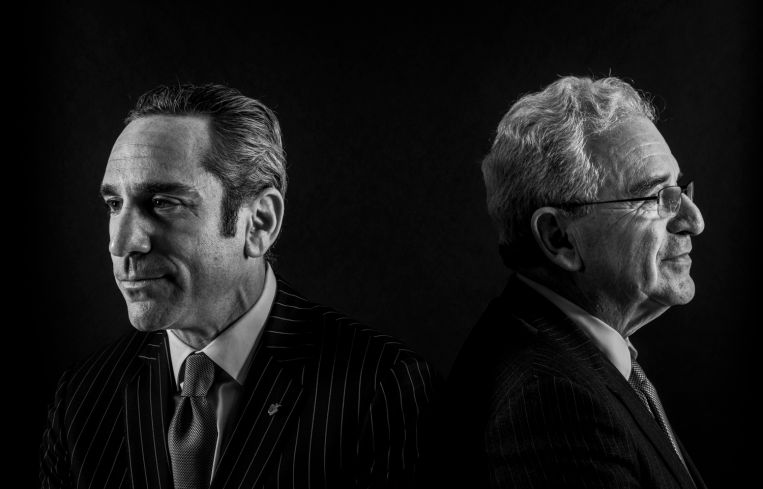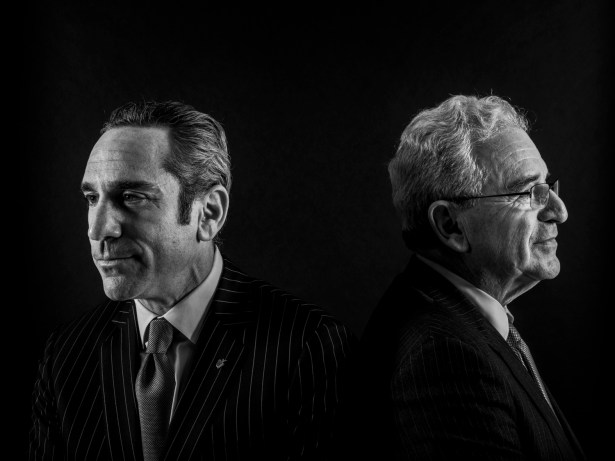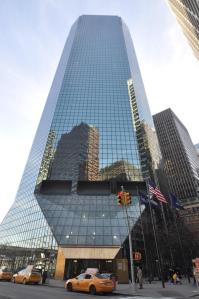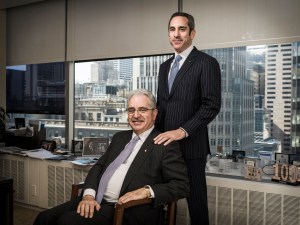Legendary Norman Sturner and Son David Take MHP South With 1.2M-SF Property
By Lauren Elkies Schram March 18, 2015 9:45 am
reprints

After 10 years out of the Downtown market, MHP Real Estate Services has jumped back into it full throttle with the January purchase of 180 Maiden Lane.
The Manhattan-based commercial real estate broker, property manager and owner paid $470 million along with Clarion Partners for the 1.2-million-square-foot Class A office tower. And now the new owners are embarking on a $28 million renovation of the 41-story glassy building, with its panoramic views of New York Harbor.
At the helm of the 44-year-old MHP is the father-and-son duo of Norman Sturner, the 74-year-old founding principal and chief executive officer, and David Sturner, the 47-year-old chief operating officer and principal. (The third principal is Brett J. Goldman, the firm’s chief financial officer.)
“David runs the day to day,” Norman told Commercial Observer during an interview in the firm’s offices at 277 Park Avenue between East 47th and East 48th Streets last week. David retorted: “We still need him around.” They bantered about who works longer hours. The answer: Norman in the office and David in the field.
Half of MHP’s business is brokerage, and roughly half of the firm’s 77 staff members are brokers. The other 50 percent of MHP’s business is comprised of project management, property management and asset management.
MHP owns, leases and manages in excess of 6 million square feet of commercial real estate representing over $450 million of total invested capital. The value of all properties MHP Real Estate Services has bought and sold exceeds $12 billion. Its assets include 180 Maiden Lane, 560 Seventh Avenue at West 40th Street, 1180 Avenue of the Americas at the corner of West 46th Street and Pepsi’s headquarters in Westchester. The rest of its portfolio is third-party management.
Norman and David talked with CO about 180 Maiden Lane, the Dream Hotel project in the Garment District and transitioning from Murray Hill Properties to MHP Real Estate Services.
Commercial Observer: What have you guys been up to?
Norman: In the last 24 months we have sold an interest in 530 Fifth Avenue, 1250 Broadway, 1 Park Avenue, 1250 Broadway and 509 Fifth Avenue.

Why?
David: Profit. We bought well and it was time.
Norman: We are minority property owners and when the major owners say, “sell,” we sell. If the majority partner tells us to paint the building blue, we buy the paint and start painting the building blue.
Why did you want 180 Maiden Lane?
Norman: It is all well and good to sell a building, take your profit and pay off the sale and put it in your pocket, but the next day, the lights have to be on. So, once we realized that a third of the portfolio was gone —
Wow.
Norman: Yeah. You sell 2.2 million feet in a matter of two years, it reduces enormous fees that are gone the next day. Once we realized that one-third of the portfolio was gone, we went out looking as we always do for something that was off market that had hair on it that needed our expertise. And SL Green [Realty, 180 Maiden Lane’s seller] said, “Would you go Downtown?”
David: We buy maybe one or two buildings a year and sell market-dependent. We’ve stuck with between 6 [million] and 7 million square feet within 15 years. We’ll look at 50 to 100 properties a year. Ninety percent of our deals are off-market.
Norman: So, of the 1 or 2 or 3 percent that we do see in a given 12 months, David will then go out and in a reasonably short amount of time come back and say, “Dad we don’t want to do it or do want to do it.”
What are some of the highlights of the 180 Maiden renovation?
David: The public plaza, fitness center, cafeteria and meeting conference center. [We have] a seven-foot-high waterfront fence that surrounds the entire building. The cafeteria will be run by a well-known high-end restaurateur with multiple locations. He will run the cafeteria and the kiosk in the plaza area. It’s a major name and if I told you, you would know them.
The largest tenant is law firm Stroock, Stroock & Lavan, which has over 225,000 square feet. What other tenants are there in the building?
Norman: Two smaller tenants that are leaving within 20 months.
That will bring you to how much vacant space?
Norman: 830,000 square feet. We have 100,000 square feet of paper on the street negotiated. We’ve only owned this thing for eight weeks.
David: We’ll probably open the second and third floors [with the cafeteria and fitness center] in less than 12 weeks. [Pending city approval], the plaza will open in late June or early July.

What are the rents?
David: [Across the entire building] we’ll average in the $50s to $60 per square foot.
Norman: This market is getting tighter all of the time. Downtown is the new New York.
Anything else you want to say about Downtown?
Norman: We’re having meetings with Jessica Lappin [the president of the Alliance for Downtown New York]. We sold all of our buildings Downtown, other than 30 Broad [and 83 Maiden] in the 1990s. [Those two we] sold in 2003 [and 2005, respectively]. We’re just getting our feet back wet again.
David: We can’t buy [buildings] at $700 [per foot, like in Midtown] and add value. Downtown has provided an opportunity for what we do.
Who are your preferred lenders?
David: I’m gonna let you speak because you are very careful.
Norman: The last one. [Laughs] Or the next one. Your choice. Our last loan was with Blackstone. The previous one was done with Colony.
Is there one that you’ve used more than others?
David: Not anymore. In the past it had been one, probably Bank of America. We did more loans with them back in the day—
Norman: We look for the best deal for the project and sometimes because of size, you eliminate a lot of the folks. One of the absolute principles is that we will not do a CMBS loan or a loan not serviced by the lender. When changes occur or tough times happen, we always want to have someone with authority that we can speak with. It is very important to us to do that.
Norman, how’d you get into real estate in 1971?
Norman: Neil [Siderow] and I sold insurance companies at night and traded securities by day. In 1971, somebody walked in, he was a friend of a friend, and said, “I’m stuck on a building at 469 West 57th Street.” He had a hard deposit down to buy the building. He couldn’t find the rest of the money. The city was merging on bankruptcy. We raised the money. We bought the building.
|
“Downtown is the new New York.” |
For how much?
Norman: $70,000. [Neil and I] turned around after the third deal [with the guy] and said to each other, “Do you really want to be in the insurance or the securities business for the rest of your life?” Neil and I both said, “No!” (Mr. Siderow, who ran the brokerage side of the business, retired in early 2011.)
How did you come up with the Murray Hill Properties name?
Norman: The Murray Hill News, a local paper. Our first office was at 130 Madison Avenue in the heart of Murray Hill.
David: And a couple of the commercial buildings they started to buy were in the area.
Norman: The first commercial building that we bought was 244 Fifth Avenue for $50,000 in 1971.
Did you change the name of the company to MHP Real Estate Services in 2013 because you didn’t want to be known as just a Murray Hill company?
David: That’s his fault [points to David Greene, the president of brokerage services]. No, not his fault, it was his idea.
Norman: The joke was [Mr. Siderow and I] would walk in and I would say, “I’m Murray.” He would say, “I’m Hill.”
David: Norman has a passion for “Murray Hill Properties” and this logo of the apple with the slice of it with the skyline of Manhattan on it—it is a great logo. We use it on certain bridge scaffolding, but it needed to be rebranded.
David, you started at Murray Hill Properties in 1995. Why didn’t you start there right out of school?
David: When I got out of college, my father asked me what I wanted to do and I said that I wanted to work for him because I had worked in the summers and I had certainly grown up as a real estate kid. I loved Manhattan. And he said, “No!” He said, “You have to go learn something that I don’t know.” He said, “You need to be able to bring something to the table and I can see where our company is headed.” Norman started looking at properties and saw that they were large capital requirements—things that we didn’t do at the time—doing elevators, new lobbies, renovations. So he told me to go work for a general contractor—Structure Tone. I went on board with Structure Tone in ’89 and worked for them for more than six and a half years.
Norman: David brought an entirely new angle to the only thing we had ever done, which was we bought a building, maybe we painted it, and then the market took it away because we either rented it out or made it more presentable.
David: Norman asked me to go build a team that would be able to provide the services, as well as provide the service of the due diligence process, which was key.
Shifting gears, Soho Properties, MHP Real Estate Services and Hampshire Hotels Management are bringing a $300 million Dream Hotel to 560 Seventh Avenue. You guys bought the site for $61.5 million in February 2014. What’s the lastest there?
David: We are shopping construction financing. Eighty percent of the plans are ready. We are buying air rights. The [Garment Center Congregation] is the last tenant. They are not out yet. The temporary synagogue will be built [at 1384 Broadway between West 37th and West 38th Streets] in late April.
How’d you get involved at 560 Seventh Avenue?
Norman: We wanted to get involved with the product. [Developer Sharif El-Gamal, the chairman and chief executive officer of Soho Properties,] came to us. We helped him raise the money and negotiate the temple.
Do you really want to bring the synagogue back after it moves to a temporary location you are building out?
David: It’s being planned that way. We think we’ll be able to find a suitable home for them within two years. The temporary synagogue is on a five-year lease. They want one location [instead of two, with High Holiday services being held at Gotham Hall at 1356 Broadway between West 36th and West 37th Streets]. We’re happy to take them back. There will be a ground floor entrance with a Sabbath-compliant elevator with a 12,000-square-foot synagogue [in the basement].
Tell us more about the Dream Hotel. How many rooms will it have? How big will the hotel be? Etc.
David: There will be 237 rooms, about 100,000 square feet, a full [food and beverage] package, a fully operating restaurant, a two-story club lounge on the roof with an outdoor deck with views of the ball dropping on New Year’s Eve. Below the hotel there will be 17,000 square feet of retail. We are doing it in-house and are looking at it as one condo. We are looking for one purchaser [to spend] $100 million.



